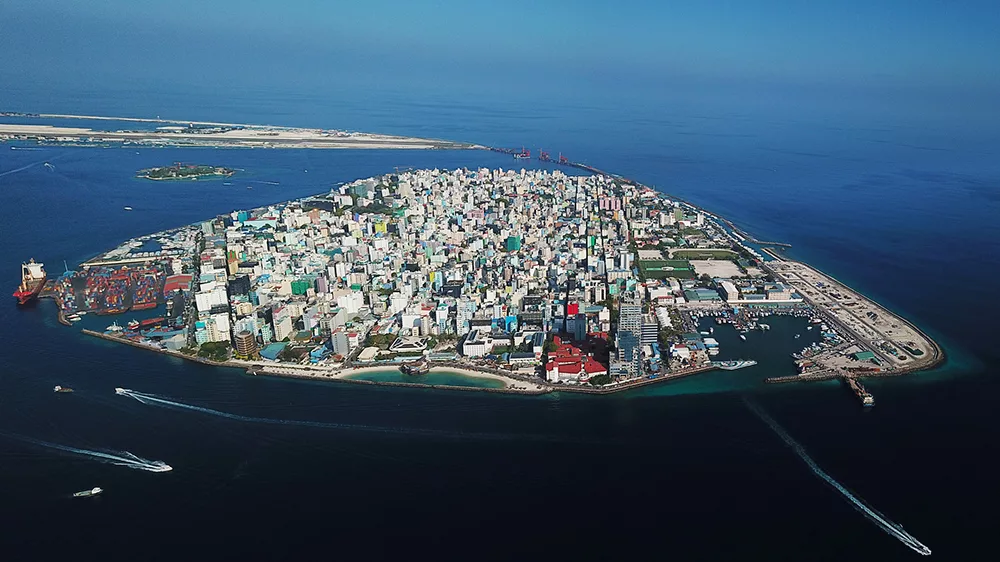Pioneering Shari’ah Finance Philosophy with a Go-Ahead, Client-Centric Stance
Collaboration and consideration of diversity has taken MIB to the forefront of banking in Maldives
The story of the Maldives Islamic Bank, the first and only fully Shari’ah-compliant bank in the South Asian country, is one of collaboration.
The Islamic Corporation for the Development of the Private Sector (ICD), the private arm of the Islamic Development Bank Group (IsDB), and the Government of Maldives, represented by the Ministry of Finance, entered into an agreement on October 4, 2009.

Malé, Maldives. Photo: Shahee Ilyas, CC BY 3.0, via Wikimedia Commons
Their aim was the development and launch of Islamic banking services in the Maldives, fully in-line with principles of Shari’ah. It opened its doors to the public on March 7, 2011, with the inauguration of the main branch in the capital, Malé. Expansion to all major population centres of the nation swiftly followed.
There are now six branches in five atolls across the island nation. MIB has been listed on Maldives Stock Exchange — as the only full-fledged Islamic bank in Maldives — since November 2019. Today, 20 percent of its share capital is owned by the general public, in line with the principle of increasing public participation.
Incorporated as a PLC, MIB came into being with the intention of providing an alternative for those dedicated to compliance with the principles of Islamic banking. The primary goal was to provide an opportunity to be a part of a fast-growing global community. “We are an active participant in the development and promotion of a viable Islamic economics and financial system in the Maldives,” says CEO Mufaddal Idris Khumri.
“We provide a full range of Shari’ah-compliant deposit products and financing solutions catering to the general public, both individuals and businesses. We provide services through a branch network in nine island locations to meet the growing demand.”
The bank has a strong ATM network, with point-of-sale terminals at merchant outlets and available via its online services, FaisaNet and FaisaMobile. The aim is to exceed customer expectations of modern banking services.
Pioneer in Banking
Until MIB started its operation, Islamic banking was not available in the country. The launch brought to reality a long and cherished pursuit of the service.
Since its inception, MIB has implemented unique business models and contributed to the development of a financial system that runs in parallel to conventional ones.
Fully-fledged Products
MIB’s extensive range of compliant financing products has enabled the bank to get a firm foothold in the market. Its comprehensive portfolio, and its deployment of funds to financing individuals, benefit local SMEs and corporates. They have also allowed Maldives Islamic Bank to meet customer needs in the areas of retail, corporate, and SME banking, as well as trade and project financing, and general asset financing. The bank strives to regularly diversify and enhance its portfolio. It has opened its doors and launched non-resident foreign accounts, expanding its services to a broader audience.
Customer service is central to operations, delivering a holistic experience to its clients. All aspects are carefully monitored and fine-tuned. Value-added services are linked to secure and reliable technology. Long-term relationships are favoured over one-off transactions, and referrals by existing customers show the proof of concept.
The bank has 24/7 helpline and ticketing systems, constantly monitored by customer service teams. MIB has introduced convenient and flexible modes of communication, including chat, social media, and email.
Reliable Infrastructure
The bank and its operations are complemented by a network of state-of-the-art digital infrastructure. Special attention has been paid to establishing safe, secure, innovative and resilient systems which give customers confidence. MIB continues to offer a range of secure platforms for internet and mobile banking, and trustworthy distribution channels including ECRMs, ATMs, POS machines and cards, in addition to payment gateways and customer application portals.
MIB’s service application portal “ApplyNow” has been integrated with the National Digital Identity system “efaas,” enabling customers to complete the full customer journey digitally without having to be physically present for verification. This makes it convenient for the customer, allowing them to apply for any service anytime, anywhere. With efaas integration, the customer’s bank account can be opened instantly, and they can apply for the card simultaneously.
Human Capital
MIB’s success is largely thanks to the strength of its workforce, whose experience and specialised knowledge allow clients to meet multiple challenges in a dynamic business environment. Continuous development and retention of the diverse staff is ensured via advanced recruitment procedures, as well as training and promotion. Dedicated human resources continue to drive MIB’s operations and performance and is one of its primary pillars. MIB proudly stands as the only Islamic bank in the world with a majority female workforce, showcasing diversity and inclusivity. It takes pride in its youthful workforce, with an average employee age of 31, reflecting the dynamism and innovation of a millennial-driven bank.
The positive, results-orientated and friendly culture is warmly embraced by its 250 employees. While more than 97 percent of staff are Maldivian, the cadre is supplemented with foreign employees. This has allowed the bank to identify and adhere to best practices and bring a fresh outlook. Maldives Islamic Bank adopts performance-driven rewards systems to ensure fair compensation. MIB empowers its team with autonomy and accountability, and celebrates individual differences by supporting the development of each employee.
You may have an interest in also reading…
Now I See: ICICI Bank Builds Bridges Linking India and UK
ICICI Bank is one of the leading Indian multinational banking and financial services institutions, with a presence in 15 countries,
The IMF on Prospects for Growth: Latin America & Caribbean
Growth in Latin America and the Caribbean is set to pick up from 3 percent in 2012 to 3½ percent
Committed to the Future, Driven by Passion, Dedicated to Clients, and Steadfast on Sustainability
Swiss asset management firm keeps a tight focus on its core values, customer needs, and the drive for responsible investment















































































